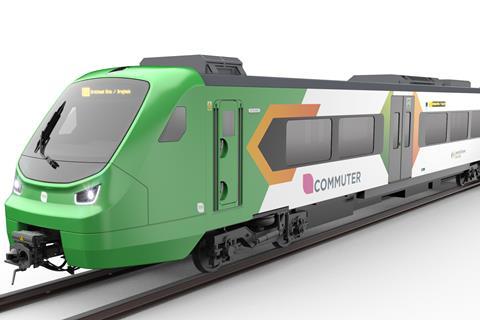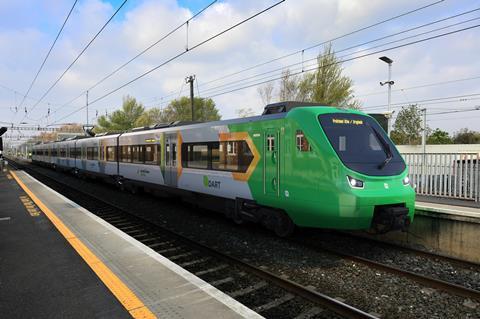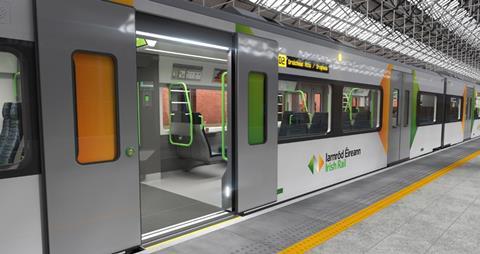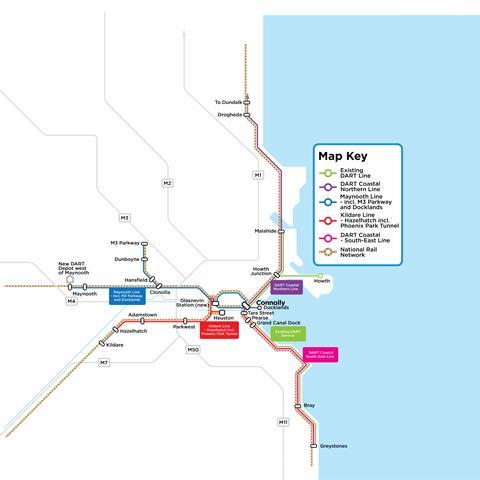
IRELAND: National railway Iarnród Éireann has been given the go-ahead to place a firm order for a further 18 five-car Alstom battery-electric multiple-units as part of the DART+ programme to expand Dublin commuter services.
The order was approved by the cabinet on November 29 and is expected to be finalised before Christmas, with deliveries scheduled for 2026 and entry into service by Q1 2027. The €179m cost is to be met by the Department of Transport through the National Transport Authority.
Fleet design

The order is to be placed as under a December 2021 framework agreement with Alstom covering up to 750 cars. This included an initial €317∙8m firm order for 13 battery-electric units and six electric-only units to enter service from Q3 2025.
Final sign-off of the design is expected in May 2023, following an extensive consultation and review process.
The articulated EMU and BEMU sets will be identical apart from the battery packs on the end vehicles. These will have a combined capacity of 840 kWh and are expected to give a range of around 80 km with a significant contingency.
The EMUs are to be used to increase capacity and frequencies on the existing DART network, while the BEMUs will take over services to Dublin from Drogheda, where fast charging facilities will be installed to enable sets to be fully charged when departing over the non-electrified as far as Malahide. Initial plans do not envisage batteries being topped up from the overhead line, but there is an option to modify the catenary equipment to allow a small amount of low-power charging, in the region of 200 A, to reduce the time needed for fast charging.
The contract includes the replacement of batteries after nine years, or earlier should any fall below 80% of initial capacity.
Production and delivery

Delivery of the initial batch of units from Alstom’s facility in Poland is due to begin in mid-2024; assembly involves bringing together components from a range of countries including aluminium extrusion bodyshells from China, cabs from Italy and bogies from France.
Testing will be carried out in Ireland, as the 1 600 mm gauge rules out using any of the European test facilities.
The new units will enable the phased withdrawal of the oldest Class 8100 DART units which entered service in 1983-84 and would otherwise need extensive life-extension work.
The contract also includes a TSSSA agreement running for 15 years from vehicle acceptance under which Alstom will provide technical support, spares, light and heavy maintenance and management of any casualties.
The fleet will be based at a depot to be constructed at Maynooth; electrification from the existing electric network to the site is an early priority for the DART+ project.
| Alstom DART+ train sub-suppliers | |
|---|---|
| Car body profiles | Qixing |
| Passenger saloon HVAC | Thermoking |
| Passenger doors and gap filler | IFE Knorr-Bremse |
| Air and braking system | Wabtec Faiveley |
| Pantograph | Schunk |
| Passenger information system | Annax |
| Passenger seats | Fainsa |
| Driver seats | Grammer |
| Windows | Saint-Gobain |
| Windshield | Dellner Percy Lane and Dellner Romag |
| Couplers | Dellner |
| Gangway | Hubner |
| Traction battery | Actia |
| Driver alert system | Datik |
| Connected driver advisory system | Cubris |
| On-train data recorder | HaslerRail |
DART+ programme

The DART+ programme will expand DART commuter services from Dublin north to Drogheda, west to Maynooth/M3 Parkway and southwest to Celbridge/Hazelhatch, increasing the number of people living within 1 km of a DART station from 250 000 to 600 000.
National Transport Authority CEO Anne Graham said ‘in the draft Greater Dublin Area Transport Strategy 2022-42, we announced that public service obligation bus and commuter rail fleets in the Dublin metropolitan area will be 100% electric and zero-emission by 2035. Today’s announcement marks a significant step towards that objective.’
Iarnód Éíreann CEO Jim Meade added that the benefits of the latest order ‘will be felt nationwide, as existing inter-city and commuter carriages operating in the greater Dublin area are freed up for use around the national network for more frequent services and more capacity on a range of routes’.
The government said the ‘adaptable nature’ of the vehicles means there will also be the potential to use them ‘at some stage in the future’ between Greystones and Wicklow and/or for Cork commuter services to Mallow, Cork, Cobh and Midleton, subject to funding being made available for the necessary infrastructure.

















